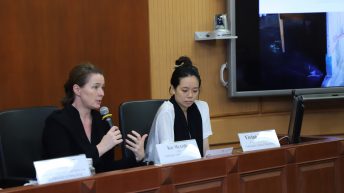Date: 31Oct 2014
This talk provides an unorthodox account of environmental law-making. Environmental law has long been conceived as purely a public law field, often closely linked with domestic administrative law. The key question that underlies most environmental law scholarship is “what should the government do”. Yet environmental deal-making is all around us. And it is not without relevance for law. Consumers are insisting on environmental standards throughout long, murky and complex supply chains. Indigenous communities are negotiating environmental monitoring regimes as part of benefit agreements with mining companies. Environmental NGO’s are outbidding logging companies in bids for forest concessions. Countries are requesting payments to leave oil deposits in the ground in areas of high biodiversity. This ‘hidden’ environmental law forces us to confront assumptions about both the nature of law and the existing law to protect nature.
Dr. Natasha Affolder is Associate Dean Research International and an Associate Professor at the University of British Columbia, Faculty of Law. Dr. Affolder publishes and lectures widely on diverse aspects of transnational environmental law. Current research projects include a study of transnational contracts as a mechanism for biodiversity protection. Her research appears in leading law reviews including the American Journal of International Law, the Leiden Journal of International Law, the Chicago Journal of International Law, and the McGill Law Journal. Professor Affolder earned her BCL and her doctorate in law from Oxford University.




